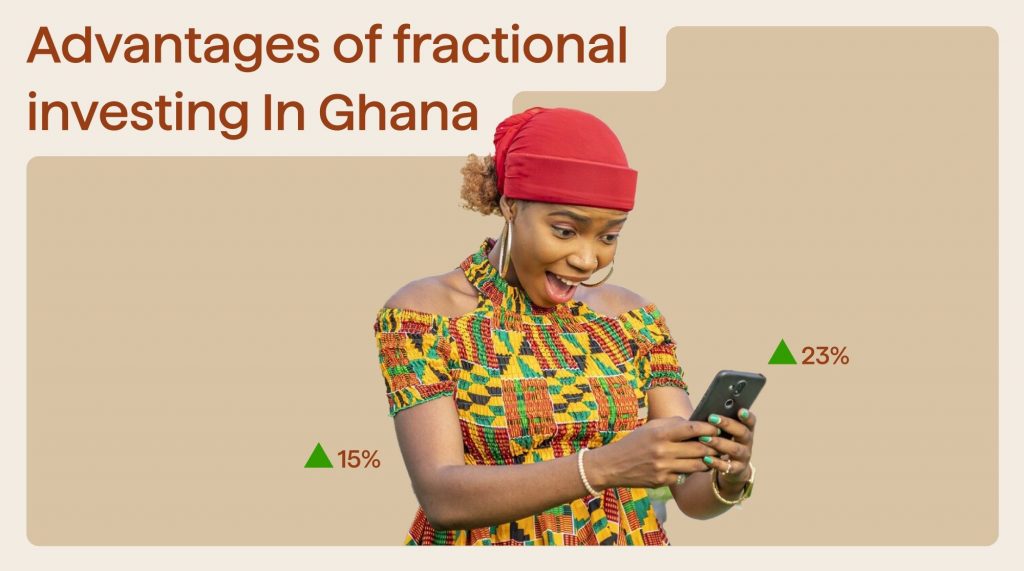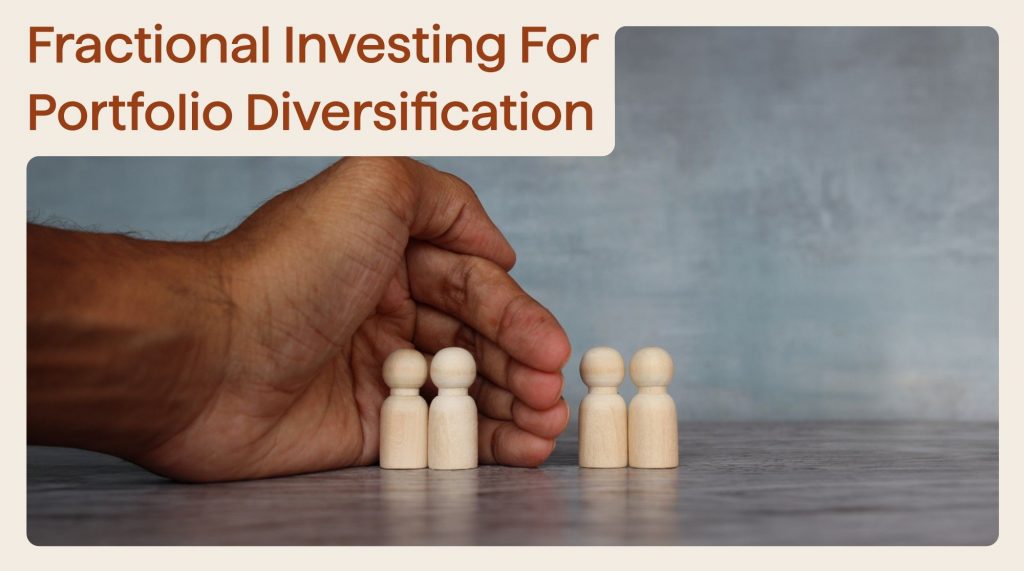Fractional investing, a transformative approach to wealth creation, has emerged as a powerful tool for Ghanaians to participate in the global financial markets.
This quiet revolution in finance is taking place in the bustling streets of Accra and across the vibrant regions of Ghana, one that promises greater accessibility and opportunity for individuals of all backgrounds.
It opens doors to diverse investment opportunities, enabling you to become a shareholder in international companies, own fractions of real estate properties, and cultivate a diversified portfolio that aligns with your financial goals.
In this comprehensive guide, we will delve into the world of fractional investing in Ghana, exploring what it is, how it works, and the remarkable advantages it offers to those seeking to secure their financial future.
We will also shed light on the potential pitfalls to avoid and share strategies that empower you to navigate this exciting landscape, unlocking the path to financial freedom.
What Is Fractional Investing?
Fractional investing, also known as “fractional ownership,” is a modern investment method that allows individuals to purchase and own a portion or a fraction of high-value assets, typically assets like stocks, real estate, or exchange-traded funds (ETFs).
Instead of needing the financial muscle to buy entire shares or properties, fractional investing enables you to own a piece of these assets, proportionate to the amount you’re willing to invest. This means you can become a shareholder in your favorite companies or a real estate investor, even if you don’t have the resources to buy an entire share or property.
Understanding Fractional Investing
To understand fractional investing better, let’s break down how it works. In a traditional investment scenario, if you wanted to buy shares of a company trading at $100 per share, you would typically need $100 to acquire a single share. With fractional investing, you can invest an amount that suits your budget. For example, you could invest $10 or any amount you’re comfortable with, and you would own a fraction of that $100 share, equivalent to your investment.
This means you’re still entitled to a share of any potential dividends and any capital gains that result from the stock’s performance. The ownership structure in fractional investing operates seamlessly, just as if you held an entire share. This concept effectively democratizes investment ownership, putting financial opportunities within reach for a broader audience.
Empowering Ghanaians in the World of Finance
Fractional investing is particularly empowering for Ghanaians who may have been deterred by the traditional investment process due to the need for significant capital. It allows individuals to invest at their own pace and on their own terms, irrespective of their initial investment size.
It brings financial inclusion to the forefront, making it possible for people from all walks of life to participate in the world of finance and build wealth over time.
So, whether you’re an aspiring investor in Accra, a student in Kumasi, or a young professional in Tamale, fractional investing opens up the possibilities for you to engage in the financial markets, explore investment options, and work towards securing your financial future.
It’s a game-changer, and it’s accessible to you right here in Ghana. In the subsequent sections of this guide, we’ll delve deeper into how fractional investing can be harnessed to make money intelligently in Ghana.
How Fractional Investing Works


Understanding how fractional investing works is crucial to unleashing its full potential. This groundbreaking approach to investment not only opens doors to a wider audience but also redefines the very essence of ownership in financial markets.
Let’s delve into the intricacies of how fractional investing works and how Ghanaians can leverage this innovative method to participate in global markets.
In fractional investing, investors can buy and sell fractions of shares through specialized platforms. This means that you don’t need to buy a whole share of a company; instead, you can own a percentage of that share. This method democratizes investing, making it more accessible for people with varying investment budget sizes.
In traditional investing, owning a share of a company or a piece of real estate often requires a substantial upfront investment. Fractional investing disrupts this model by breaking down the barriers that once limited participation based on financial capacity.
It allows individuals in Ghana, regardless of their budget, to become investors in high-value assets.
The Use Of Technology
The heart of fractional investing lies in specialized online platforms. These platforms serve as the bridge connecting investors with fractional shares of various assets. Whether it’s stocks of multinational corporations or shares in a real estate venture, these platforms facilitate the buying and selling of fractions of assets.
Accessible Investment Units
Consider this scenario: a renowned technology company’s stock is trading at $500 per share. In traditional investing, you would need $500 to buy a single share. However, with fractional investing, you could invest $50, and in return, you would own 1/10th of that share.
This means you participate in the company’s performance, including potential dividends and capital gains, according to the proportion of the share you own.
Proportional Ownership and Benefits
Fractional ownership mirrors traditional ownership in terms of rights and benefits. As a fractional investor, you’re entitled to a proportionate share of any dividends the asset may generate, as well as a share of the capital gains if the asset’s value increases.
This approach democratizes the financial landscape, ensuring that even small-scale investors in Ghana can benefit from the success of large corporations and lucrative real estate ventures.
Diversification Opportunities
Another notable aspect of how fractional investing works is its role in portfolio diversification. With fractional investing platforms offering access to a myriad of assets, investors in Ghana can build diversified portfolios without the need for a significant capital outlay. This diversification helps manage risk, as gains in one asset may offset losses in another, providing a more resilient investment strategy.
Real-Time Trading
Fractional investing platforms operate in real-time, allowing investors to buy and sell fractional shares as market conditions change. This flexibility empowers Ghanaians to adapt their investment strategies swiftly, responding to market trends and optimizing their portfolios accordingly.
In essence, fractional investing operates on the principle of making investing more inclusive and flexible. By breaking down the barriers to entry, individuals in Ghana can participate in the global financial markets, shaping their financial destinies one fraction at a time.
As we continue our exploration, we’ll look at how Ghanaians can tap into fractional investing in US stocks and navigate the landscape of the best fractional investing platforms available.
Fractional Investing In US Stocks In Ghana
One of the exciting aspects of fractional investing is the ability to invest in global markets, including US stocks, right from Ghana. This allows Ghanaians to diversify their portfolios and take advantage of opportunities in some of the world’s most dynamic companies.
Embracing the opportunities of fractional investing doesn’t confine Ghanaians to local markets alone. One of the exciting facets of this investment approach is the ability to delve into the vast realm of U.S. stocks right from the vibrant cities of Ghana.
Let’s explore how fractional investing facilitates access to the U.S. stock market and the implications this holds for investors in Ghana.
Global Market Access
Historically, participating in U.S. stocks often required significant capital, limiting the ability of international investors to join in. However, fractional investing platforms have effectively erased these geographical barriers. Ghanaians can now seamlessly invest in some of the most influential companies listed on U.S. stock exchanges, regardless of their initial investment size.
Diversification Beyond Borders
By tapping into U.S. stocks through fractional investing, Ghanaians gain a valuable opportunity for portfolio diversification. The U.S. stock market is home to a diverse array of industries and companies, ranging from tech giants like Apple and Microsoft to pharmaceutical leaders like Pfizer and Johnson & Johnson.
Fractional investing allows Ghanaians to diversify their portfolios by owning fractions of shares in these globally influential companies.
Navigating International Markets
Engaging in fractional investing in U.S. stocks from Ghana involves utilizing the services of fractional investing platforms that provide access to these markets. These platforms, such as Trovecrunch, Investafrica, and EasyVest, act as gateways, allowing Ghanaians to buy and sell fractions of U.S. stocks with ease.
Currency Considerations
When investing in U.S. stocks from Ghana, it’s essential to be mindful of currency exchange rates. Transactions are typically conducted in U.S. dollars, and any gains or losses will be subject to currency fluctuations.
Some platforms may offer features to simplify these transactions or hedge against currency risks, providing a more seamless experience for investors.
Research and Informed Decisions
As with any investment, conducting thorough research is paramount when delving into U.S. stocks through fractional investing. Understanding the companies, their performance, and the broader economic landscape is crucial for making informed investment decisions. Fractional investors in Ghana should stay updated on market trends, economic indicators, and any developments that may impact the U.S. stock market.
Regulatory Compliance
It’s also important for Ghanaian investors to be aware of and compliant with regulatory requirements. Different platforms may have specific compliance measures, and staying informed about these regulations ensures a smooth and legal investment experience.
Fractional investing in U.S. stocks from Ghana is a testament to the democratization of global financial markets. It empowers individuals to participate in the growth of international companies, fostering a sense of interconnectedness in the world of finance.
As we explore further, we’ll identify the best fractional investing platforms available for Ghanaians to embark on their journey into fractional ownership of global assets.
Best Fractional Investing Platforms in Ghana
To embark on your fractional investing journey in Ghana, it’s crucial to choose the right platform. Selecting the right fractional investing platform is pivotal to a successful and seamless investment experience.
In Ghana, several platforms cater to the growing interest in fractional investing, each offering distinct features and advantages.
Choosing the Right Platform For Fractional Investing
Bamboo is one of the best fractional investing platforms that empower Ghanaians to engage in the world of finance on their terms. Bamboo has earned a reputation for its user-friendly interface and a wide range of investment options. It allows Ghanaians to invest in fractional shares of U.S. stocks and ETFs, making it an ideal platform for those looking to diversify their portfolios with global assets.
Bamboo is a platform specifically tailored to focus on African markets, providing Ghanaians and Africans with opportunities to invest in fractional shares of US companies. Bamboo stands out for its user-friendly platform and comprehensive educational resources. The platform’s emphasis on simplicity and education makes it an excellent choice for those new to fractional investing.
When selecting a fractional investing platform, Ghanaians should consider factors such as user interface, available investment options, fees, and customer support. Reading reviews, exploring the platform’s features, and understanding its regulatory compliance are essential steps in making an informed decision.
Remember that the best platform for one investor may not be the best for another, as preferences and investment goals vary. Whether you prioritize a wide range of global stocks, a focus on local markets, or specific asset classes like real estate, there’s likely a platform that aligns with your investment objectives.
As you embark on your fractional investing journey in Ghana, choose a platform that not only meets your immediate needs but also aligns with your long-term financial goals. The right platform can be a key enabler in your quest to build a diversified and successful investment portfolio.
How To Get Started With Fractional Investing In Ghana
Embarking on your fractional investing journey in Ghana is an exciting endeavor that begins with a few key steps. From researching platforms to making your first investment, let’s explore a comprehensive guide on how to get started with fractional investing in Ghana.
1. Research Fractional Investing Platforms:
Before diving in, take the time to research and compare different fractional investing platforms available to Ghanaians. Consider factors such as user interface, available investment options, fees, and customer reviews. The goal is to find a platform that aligns with your investment goals and preferences.
One of the most popular investment platforms for investing in fractional shares in Ghana is Bamboo. Bamboo has earned a reputation for its user-friendly interface and a wide range of investment options. It allows Ghanaians to invest in fractional shares of U.S. stocks and ETFs, making it an ideal platform for those looking to diversify their portfolios with global assets.
2. Create an Account:
Once you’ve identified a suitable platform, the next step is to create an account. This typically involves providing some personal information, including identification documents and financial details. Platforms adhere to regulatory standards to ensure the security and legitimacy of their users.
3. Fund Your Account:
After successfully creating your account, you’ll need to fund it with the amount you intend to invest. Fractional investing platforms usually offer various payment methods, including bank transfers and online payment systems. The minimum investment amount can vary between platforms, so be sure to check the specific requirements of the platform you’ve chosen.
4. Explore Available Fractional Shares:
With your account funded, it’s time to explore the available fractional shares. Most platforms provide a user-friendly interface that allows you to browse through a range of stocks, ETFs, and potentially other assets like real estate. Take your time to research and consider assets that align with your investment strategy and risk tolerance.
5. Start Investing:
Once you’ve identified the fractional shares you want to invest in, it’s time to make your first investment. The platform will guide you through the process, allowing you to specify the amount you want to invest. Confirm your investment, and you’ll become a fractional owner of the chosen asset.
6. Monitor Your Portfolio:
Fractional investing doesn’t end with your initial investment. Regularly monitor your portfolio to stay informed about the performance of your fractional shares. Many platforms provide tools and analytics to help you track your investments and make informed decisions as market conditions evolve.
7. Learn and Stay Informed:
Continuous learning is a key aspect of successful investing. Stay informed about market trends, economic indicators, and any developments that may impact your investments. Many fractional investing platforms also offer educational resources, including articles, tutorials, and webinars, to help you enhance your investment knowledge.
8. Consider Dollar-Cost Averaging:
Dollar-cost averaging is a strategy where you invest a fixed amount at regular intervals, regardless of the asset’s price. This approach can help reduce the impact of market volatility over time and is particularly suitable for long-term investors.
Getting started with fractional investing in Ghana is a process that involves careful consideration, research, and proactive decision-making. By following these steps and staying engaged with your investments, you’ll be well on your way to navigating the world of fractional ownership and building a diversified and resilient investment portfolio.
Advantages of Fractional Investing In Ghana


Fractional investing offers a range of advantages that make it an appealing option for individuals in Ghana looking to venture into the world of finance. Whether you’re a seasoned investor or a newcomer to the market, understanding these advantages can help you make informed decisions about integrating fractional investing into your financial strategy.
1. Affordability:
Fractional investing eliminates the need for a significant upfront investment. Ghanaians can enter the market with amounts as low as $10, making it accessible to a broader population.
Flexibility: Invest according to your budget and financial goals, contributing regularly to build your portfolio over time.
2. Diversification Opportunities:
Fractional investing platforms provide Ghanaians with the opportunity to diversify their portfolios by investing in a wide range of assets, including U.S. stocks and global securities.
Risk Management: Spreading investments across different assets helps manage risk. Even with a modest investment, individuals can build a diversified portfolio.
3. Global Opportunities:
Fractional investing platforms enable Ghanaians to invest in U.S. stocks without the need for a large capital outlay. This opens the door to global opportunities and allows investors to benefit from the success of international companies.
Accessibility and Inclusivity:
Fractional investing democratizes finance, making it inclusive for individuals with varying levels of financial means. It empowers Ghanaians from diverse backgrounds to participate in wealth-building opportunities.
5. Liquidity and Real-Time Trading:
Fractional investing platforms operate in real-time, allowing investors to buy and sell fractional shares as market conditions change. This provides liquidity and flexibility, empowering investors to adapt to changing market trends.
6. Portfolio Customization:
Fractional investing allows for precise customization of investment strategies. Ghanaians can build portfolios that align with their financial goals, risk tolerance, and preferences, choosing from a diverse range of assets.
7. Dividend Income:
Fractional investors are entitled to receive dividends proportionate to their ownership. This creates an additional stream of passive income, contributing to the overall return on investment.
8. Educational Resources:
Many fractional investing platforms offer educational resources, tutorials, and insights to help investors enhance their financial literacy. This learning aspect can empower Ghanaians to make informed investment decisions.
9. Low Entry Barrier:
The low entry barrier, with some platforms allowing investments as low as $10, makes fractional investing an attractive option for those who may have been excluded from traditional investing due to high capital requirements.
10. Flexible Strategies:
Fractional investing accommodates flexible strategies like dollar-cost averaging, allowing investors to mitigate the impact of market volatility by investing fixed amounts at regular intervals.
Understanding these advantages positions individuals in Ghana to leverage fractional investing as a powerful tool for wealth creation. By embracing these benefits, investors can navigate the financial markets with confidence, build diversified portfolios, and work towards achieving their long-term financial objectives.
Disadvantages of Fractional Investing In Ghana
While fractional investing presents numerous advantages, it’s essential for investors in Ghana to be aware of potential drawbacks and challenges. Understanding these disadvantages can help individuals make informed decisions and navigate the world of fractional ownership with a realistic perspective. Here are some key disadvantages to consider:
1. Fees and Costs:
Some fractional investing platforms may charge fees for transactions or account maintenance. While these fees are often lower than traditional investment fees, they can still impact returns, especially for investors with smaller portfolios.
2. Market Volatility:
Fractional investing doesn’t eliminate market risks. The value of fractional shares can still fluctuate based on market conditions. Investors should be prepared for the potential impact of market volatility on their investments.
3. Limited Voting Rights:
Fractional investors typically don’t have the same voting rights as those who own full shares. This means that investors may have limited influence on corporate decisions compared to traditional shareholders.
4. Dependency on Platforms:
Fractional investing relies heavily on online platforms. Any technical issues or disruptions in the platform’s services may temporarily hinder an investor’s ability to trade or access their portfolio.
5. Currency Exchange Risks:
Impact on International Investments: For Ghanaians investing in international markets, especially in U.S. stocks, currency exchange rates can introduce an additional layer of risk. Fluctuations in exchange rates may impact the value of investments.
6. Reduced Impact of Dividends:
With fractional ownership, investors may hold very small portions of a company’s shares. While they are entitled to proportional dividends, the actual amounts received may be quite small, limiting the impact of dividend income.
7. Compliance Challenges:
Navigating the regulatory landscape can be a challenge, and investors need to ensure compliance with local regulations and tax requirements. Changes in regulations can also impact the operations of fractional investing platforms.
8. Possibility of Platform Closure:
While reputable platforms take measures to ensure security and compliance, there’s always a risk of a platform closing down or facing financial challenges. Investors should choose established platforms with a track record of reliability.
9. Less Control Over Timing:
Fractional investors may experience delays in executing trades, especially during periods of high market activity. This lack of immediate execution can impact the timing of investment decisions.
10. Limited Asset Types:
Restricted Investment Choices: While fractional investing platforms offer a variety of assets, they may not cover all asset classes. Investors looking for niche investments or specific industries may find their options limited.
Despite these disadvantages, it’s important to note that fractional investing remains a valuable and accessible option for many investors in Ghana. Mitigating these risks involves thorough research, diversification, and a proactive approach to staying informed about market conditions and regulatory changes. By carefully considering both the advantages and disadvantages, investors can make well-informed decisions that align with their financial goals and risk tolerance.
The Minimum Amount Required for Fractional Investing In Ghana
One of the appealing aspects of fractional investing is the low entry barrier, allowing individuals in Ghana to participate in the financial markets with minimal capital.
Understanding the minimum investment requirements is crucial for those considering fractional investing.
Here are key points to consider regarding the minimum amount required for fractional investing in Ghana:
1. Platform Variability:
Differing Minimums: The minimum investment amount can vary between fractional investing platforms. Different platforms may set different thresholds, ranging from as low as $10 to higher amounts. It’s essential to explore multiple platforms to find one that aligns with your budget.
2. Affordability:
Accessible to All Budgets: Fractional investing is designed to be affordable, making it accessible to a broad spectrum of investors. Even individuals with modest budgets can start their investment journey, contributing small amounts regularly.
3. Reduced Financial Pressure:
No Need for Full Shares: Traditional investing often requires purchasing whole shares of a stock, which can be financially demanding. Fractional investing eliminates this pressure, allowing Ghanaians to invest only the amount they are comfortable with.
4. Flexibility in Investment Sizes:
Tailored to Individual Goals: The flexibility in fractional investing extends to the ability to tailor investments to individual financial goals. Investors can start with a small amount and gradually increase their contributions as their financial capacity allows.
5. Dollar-Cost Averaging Strategy:
Incremental Investments: A common strategy in fractional investing is dollar-cost averaging, where investors contribute a fixed amount at regular intervals. This approach not only reduces the impact of market volatility but also allows for gradual and incremental investments.
6. Diverse Investment Options:
Multiple Asset Classes: The minimum investment amount applies not only to stocks but also to various asset classes. Investors can diversify their portfolios by investing in fractional shares of ETFs, real estate, and other financial instruments.
7. Platform-Specific Features:
Special Features and Bonuses: Some platforms may offer special features or bonuses for investors who meet certain criteria, such as reaching a specific investment milestone. Exploring these platform-specific features can provide additional incentives for investors in Ghana.
8. Consideration of Fees:
Impact on Small Investments: While fractional investing minimizes the need for substantial initial investments, investors should be mindful of any fees associated with the platform. In some cases, fees may have a more pronounced impact on smaller investments.
9. Educational Resources:
Empowering Investors: Many fractional investing platforms offer educational resources to empower investors, including those who may be starting with limited capital. These resources can help individuals make informed decisions and maximize the benefits of fractional investing.
Understanding the minimum amount required for fractional investing in Ghana is the first step in the journey toward financial participation. By exploring platforms, considering individual budgets, and embracing the flexibility offered by fractional investing, Ghanaians can embark on a path of wealth creation that aligns with their financial goals.
Strategies for Fractional Investing in Ghana
Navigating the world of fractional investing in Ghana requires a thoughtful approach and strategic mindset. While fractional investing provides accessibility and flexibility, having a well-defined strategy can help investors make informed decisions and optimize their investment journey. Here are some effective strategies for fractional investing:
1. Dollar-Cost Averaging (DCA)
Consistent Contributions: DCA involves investing a fixed amount of money at regular intervals, regardless of the asset’s price. This strategy minimizes the impact of market volatility, allowing investors in Ghana to accumulate shares over time at different price points.
2. Research and Due Diligence
Informed Decision-Making: Thorough research is crucial before making any investment. Ghanaians should familiarize themselves with the companies or assets they are investing in, understand market trends, and stay informed about economic indicators. Many fractional investing platforms provide educational resources to support investors in their research efforts.
3. Diversification
Spreading Risk: Diversification involves spreading investments across different asset classes, industries, or geographic regions. By owning fractions of various assets, investors can reduce risk and increase the resilience of their portfolios.
4. Set Clear Financial Goals
Define Objectives: Before starting fractional investing, Ghanaians should define their financial goals. Whether it’s saving for retirement, building an emergency fund, or funding a major purchase, having clear objectives helps guide investment decisions.
5. Stay Informed About Market Conditions
Real-Time Monitoring: Regularly monitoring the market and staying informed about global and local economic conditions is crucial. Being aware of market trends and potential shifts allows investors to adjust their strategies accordingly.
6. Long-Term Perspective
Patience and Discipline: Adopting a long-term perspective is often key to successful investing. Fractional investors in Ghana should approach their investments with patience and discipline, understanding that markets may experience short-term fluctuations.
7. Reinvest Dividends
Compound Returns: Reinvesting dividends can significantly enhance the power of compounding. Many fractional investing platforms offer automatic dividend reinvestment options, allowing investors to buy additional fractional shares with their dividend earnings.
8. Regularly Review and Rebalance
Adapt to Market Changes. Periodically reviewing and rebalancing your portfolio is important. Market conditions, economic factors, and individual asset performance can change over time. Adjusting your portfolio to align with your goals and risk tolerance is a proactive strategy.
9. Consider Your Risk Tolerance
Align Investments with Risk Appetite: Each investor has a unique risk tolerance level. Understanding and aligning your investments with your risk appetite is crucial for maintaining a comfortable and sustainable investment strategy.
10. Utilize Limit Orders:
Fractional investors can use limit orders to specify the price at which they want to buy or sell a fractional share. This adds an element of control, allowing investors to enter or exit positions at predetermined prices.
11. Stay Disciplined During Market Volatility:
Avoid Emotional Decisions. Market volatility is a natural part of investing. Fractional investors in Ghana should stay disciplined and avoid making emotional decisions during periods of market turbulence.
By incorporating these strategies into their approach, investors in Ghana can make the most of fractional investing. These strategies provide a framework for building a resilient and diversified portfolio, managing risk, and working towards achieving long-term financial objectives.
Fractional Investing For Portfolio Diversification In Ghana


Portfolio diversification is a fundamental principle in investment strategy, and fractional investing provides an excellent avenue for achieving diversification, even with smaller investment amounts.
Diversification is a key principle of successful investing. By holding fractional shares in various companies and industries, you can spread risk and enhance the resilience of your investment portfolio.
Here’s a deeper exploration of how fractional investing contributes to portfolio diversification, especially for investors in Ghana:
Access to a Range of Assets
Diverse Investment Options: Fractional investing platforms offer access to a wide range of assets, including stocks, ETFs, real estate, and more. This diversity allows investors in Ghana to build a portfolio that spans different asset classes.
Reducing Concentration Risk
Owning fractions of shares in various companies across different industries helps reduce concentration risk. If one industry faces challenges, the impact on the overall portfolio is mitigated by the diversity of investments.
Geographic Diversification
Fractional investing enables Ghanaians to invest in assets from around the world, especially in U.S. stocks. This geographic diversification exposes investors to different economies and market conditions, reducing reliance on the performance of a single region.
Risk Management
Spreading Investment Risk: Diversification is an effective risk management strategy. By holding fractions of multiple assets, investors can avoid the risk of a significant loss associated with putting all their capital into a single investment.
Sectoral Exposure
Fractional investors can strategically choose assets across sectors, ensuring that their portfolio isn’t overly reliant on the performance of a specific industry. This balanced sector exposure enhances the resilience of the portfolio.
Risk-Adjusted Returns
Portfolio diversification aims to optimize risk-adjusted returns. While individual assets may exhibit volatility, a diversified portfolio is designed to smooth out overall returns and provide a more consistent performance.
Real Estate Fractional Investing
Some platforms facilitate fractional investing in real estate. This allows investors in Ghana to diversify their portfolios by including real estate, an alternative asset class that may have a different risk-return profile compared to traditional stocks.
Customized Diversification
Fractional investing allows for precise customization of diversification strategies. Investors can choose the mix of assets that aligns with their risk tolerance, financial goals, and investment horizon.
Adaptability to Market Conditions
Fractional investors can dynamically adjust their portfolios as market conditions change. This adaptability ensures that the portfolio remains diversified and aligned with the investor’s objectives.
Income Diversification
For investors focused on income, owning fractions of dividend-paying stocks provides an additional layer of diversification through different dividend yields. This can be especially beneficial for those seeking a steady stream of passive income.
Risk Mitigation in Volatile Markets
Hedging Against Volatility: In times of market volatility, a diversified portfolio can act as a hedge. While some assets may experience declines, others may perform well, helping to offset losses and maintain overall portfolio stability.
Fractional investing empowers investors in Ghana to implement these diversification strategies without the constraints of large capital requirements. By strategically building a diversified portfolio, investors can enhance the resilience of their investments, manage risk effectively, and work towards achieving long-term financial success.
How Dividends Work With Fractional Investing
Investors in fractional shares are entitled to receive dividends proportionate to their ownership. This is an additional way to earn returns on your investment, providing a source of passive income.
Dividends play a significant role in the total return on investments, and fractional investing provides a unique avenue for investors to participate in dividend income.
Understanding how dividends work in the context of fractional investing is crucial for individuals in Ghana looking to build a diversified and income-generating portfolio. Here’s an in-depth exploration:
1. What Are Dividends?
In simple words, dividends at shares of profits. Dividends are payments made by companies to their shareholders as a share of the profits. Companies typically distribute dividends periodically, and these payments can be a source of regular income for investors.
2. Dividend-Paying Stocks
Certain stocks are known as dividend-paying stocks because they regularly distribute a portion of their earnings to shareholders. These stocks are often associated with established and financially stable companies.
3. Fractional Ownership of Dividend Stocks
When investors own fractional shares of dividend-paying stocks through fractional investing platforms, they are entitled to receive dividends proportionate to their ownership. Even if an investor owns a fraction of a share, they will receive a corresponding fraction of any dividends declared by the company.
4. Reinvestment of Dividends
Many fractional investing platforms offer the option to automatically reinvest dividends. This means that instead of receiving cash, dividends are used to purchase additional fractional shares of the same stock. This reinvestment enhances the power of compound returns over time.
5. Passive Income Stream
Regular Income for Investors: Dividend payments provide investors with a passive income stream. This can be particularly valuable for individuals in Ghana seeking a consistent source of income from their investments, whether for current expenses or as a supplement to other income sources.
6. Diversification of Income Sources
By owning fractions of different dividend-paying stocks, investors can diversify their income sources. This diversification helps mitigate the risk associated with relying on the performance of a single stock or industry.
7. Considerations for International Dividend Stocks
For investors in Ghana who own fractional shares of international dividend stocks, currency exchange rates can impact the value of dividends received. Some platforms may offer features to mitigate currency risks.
8. Monitoring Dividend Aristocrats
Some investors focus on “Dividend Aristocrats,” which are companies with a history of consistently increasing dividends. Fractional investors can consider including these stable dividend payers in their portfolios for long-term income growth.
9. Balance of Growth and Income
Fractional investors may balance their portfolios between growth-oriented assets and income-generating assets. This balance aligns with their overall investment objectives and risk tolerance.
Understanding the dynamics of dividends in fractional investing allows investors in Ghana to make strategic decisions that align with their financial goals. Whether seeking regular income, long-term growth, or a combination of both, fractional investing provides a flexible and accessible means to participate in the income potential of the stock market.
Common Mistakes to Avoid with Fractional Investing in Ghana


Fractional investing presents a wealth of opportunities for individuals in Ghana to participate in the financial markets with flexibility and affordability. However, like any investment approach, there are potential pitfalls that investors should be mindful of. Here are common mistakes to avoid when engaging in fractional investing:
- Neglecting Research
Informed Decision-Making: One of the critical mistakes is neglecting thorough research before making investment decisions. Investors in Ghana should understand the companies or assets they are investing in, as well as broader market trends.
- Ignoring Platform Selection
Choosing the Wrong Platform: Selecting the right fractional investing platform is pivotal. Neglecting to research and compare platforms can lead to suboptimal user experiences, higher fees, and limitations on available assets.
- Overlooking Fees
Ignoring the fee structure of the chosen platform can erode potential returns. Even though fractional investing fees are often lower than traditional investment fees, they can still impact the overall performance of the portfolio.
- Underestimating Market Risks
Market Volatility Awareness: Fractional investing does not eliminate market risks. Investors should not underestimate the potential for value fluctuations and should be prepared for market volatility, especially during economic uncertainties.
- Disregarding Diversification
Failing to diversify a portfolio is a common mistake. Ghanaians should avoid overconcentration in a specific asset or industry and leverage fractional investing to build a well-diversified portfolio.
- Ignoring Currency Exchange Risks
Impact on International Investments: For those investing in international assets, especially in U.S. stocks, neglecting currency exchange risks can lead to unforeseen impacts on the value of investments.
- Not Setting Clear Objectives
Undefined Financial Goals: Without clear financial objectives, investors may make impulsive decisions. Setting specific goals helps guide investment strategies and ensures that investments align with individual financial aspirations.
- Chasing Short-Term Gains
Patience for Long-Term Success: Fractional investing is not a get-rich-quick scheme. Chasing short-term gains without a long-term perspective can lead to hasty decisions and potential losses.
- Lack of Monitoring
Passive investing doesn’t mean neglecting the portfolio. Regularly monitoring investments, staying informed about market conditions, and adjusting strategies as needed are crucial for long-term success.
- Emotional Decision-Making
Emotional decision-making, especially during periods of market volatility, can lead to suboptimal outcomes. Investors in Ghana should maintain discipline and avoid making impulsive decisions based on short-term market movements.
- Overlooking Regulatory Compliance
Ignoring regulatory considerations can lead to compliance issues. It’s important for fractional investors in Ghana to be aware of and comply with local regulations governing their investments.
- Failing to Adapt Strategies
Market conditions change, and sticking rigidly to an initial investment strategy without adapting to evolving circumstances can hinder portfolio performance.
- Ignoring Dividend Reinvestment
Neglecting to set up dividend reinvestment can result in missed opportunities for compound returns. Investors should explore this option to enhance the growth of their portfolios.
- Lack of Emergency Planning
Fractional investors should avoid using their investments for short-term emergency needs. Having a separate emergency fund helps prevent the need for unplanned withdrawals from investment portfolios.
By being aware of these common mistakes, investors in Ghana can navigate the world of fractional investing with greater caution and strategic foresight. Diligence in research, platform selection, and ongoing portfolio management are crucial elements for success in the dynamic landscape of fractional ownership.
Frequently Asked Questions: Fractional Investing In Ghana
What is the difference between fractional investing and traditional investing?
Traditional investing involves purchasing whole shares of stocks or other assets. This can be a barrier for many investors, as whole shares can be expensive. Fractional investing, on the other hand, allows investors to purchase a portion of a share, making it more affordable to invest in a wider range of assets.
Is fractional investing right for me?
Fractional investing is a good option for investors who:
- Want to start investing with a small amount of money
- Want to diversify their portfolio by investing in a wider range of assets
- Want to avoid the risks of buying whole shares of expensive stocks
Is Fractional Investing Safe In Ghana?
Fractional investing is generally considered to be safe in Ghana. However, there are some risks involved, such as the risk of the underlying asset losing value. It is important to do your research and understand the risks before investing in any asset, including fractional shares.
How do I sell my fractional shares in Ghana?
The process for selling fractional shares in Ghana is typically the same as selling whole shares. You can sell your fractional shares through your broker or through a stock exchange. Investment platforms like Bamboo allow Ghanains to buy and sell fractional shares.
Is fractional investing worth it in Ghana?
Whether or not fractional investing is worth it in Ghana depends on your individual circumstances. If you are looking to start investing with a small amount of money or if you want to diversify your portfolio, then fractional investing may be a good option for you.
How much does fractional investing cost in Ghana?
The cost of fractional investing in Ghana varies depending on the broker you use. However, it is typically less expensive than traditional investing, as you are not paying to purchase whole shares.
Where can I buy fractional shares in Ghana?
There are a few different platforms where you can buy fractional shares in Ghana. One of the most popular investment platforms for investing in fractional shares in Ghana is Bamboo. Bamboo has earned a reputation for its user-friendly interface and a wide range of investment options. It allows Ghanaians to invest in fractional shares of U.S. stocks and ETFs, making it an ideal platform for those looking to diversify their portfolios with global assets.
Can I invest in fractional shares of international companies From Ghana?
Yes, you can invest in fractional shares of international companies from Ghana. Some of the platforms like Bamboo offer fractional shares of US stocks.
Is fractional investing better than traditional investing?
Fractional investing and traditional investing are both valid methods of investing. The best option for you will depend on your individual circumstances and goals.
How can I diversify my portfolio with fractional investing?
Fractional investing can be a great way to diversify your portfolio. By investing in a variety of fractional shares, you can reduce your risk and potentially increase your returns.
Fractional Investing In Ghana: Conclusion
In conclusion, fractional investing is an exciting avenue for Ghanaians to participate in the global financial markets with minimal capital. By choosing the right platforms, staying informed, and adopting sound investment strategies, individuals can build a diversified portfolio and work towards financial success.
Don’t miss out on the opportunity to own a piece of the companies you love. Start fractional investing today and take control of your financial future. Get started on Bamboo today and start building your wealth!




